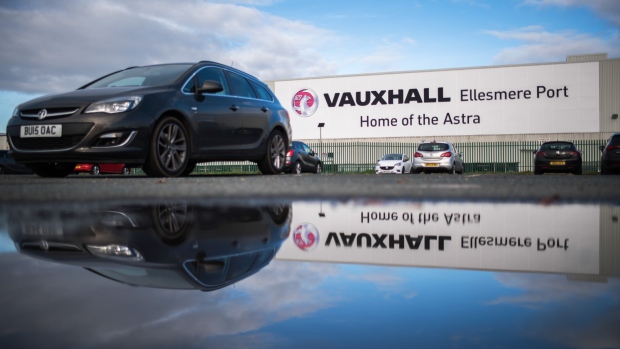Nov 15, 2018
Vauxhall Owner Is Considering Closing a Factory Post Brexit
, Bloomberg News

(Bloomberg) -- Two factories may be too many for British automaker Vauxhall, whose owner is weighing its options in case of a dip in car demand post-Brexit.
The sister brand of Opel is reviewing responses to a potential market decline after the U.K. leaves the European Union, including the feasibility of permanently shutting down one of its two sites, according to a person familiar with the matter. The person, who asked not to be identified discussing private deliberations, cautioned that no decision has been made and Vauxhall’s owner, Peugeot-maker PSA Group, was still assessing prospects.
Among other options being considered for Vauxhall: Stockpiling parts to avoid shortages ahead of the the breakup -- as aircraft engine-maker Rolls-Royce Holdings Plc has said it may do -- and bringing forward a summer shutdown like BMW AG, several people familiar with the matter said.
“We do not want to comment at this stage on Brexit process and its assessment by Groupe PSA as it is not the final step for implementation,” Vauxhall said in an e-mailed statement. “We are working in an agile mode, as usual, and we have several solutions to address different scenarios.”
A PSA spokesman declined to comment.
The Paris-based company employs about 3,000 people in the U.K., mainly at plants in Ellesmere Port, where it builds the Astra model south of Liverpool, and Luton, near London, which turns out medium-size vans. Like other carmakers, it’s been seeking clarity on what happens after March 29. Prime Minister Theresa May this week put forward an agreement that would ease some concerns by keeping the U.K. in the customs union for now. However, the plan has been challenged from within her Conservative party, underscoring the unpredictable outcome of the political drama.
Alternatives to May’s plan include crashing out of the EU with no deal, which would lead to costly border controls and tariffs, or political turmoil that could put the Labour Party in power or lead to a new Brexit vote.
Brexit, along with a drop in diesel’s popularity, has already hurt U.K. car sales this year. New-car registrations are down 7.2 percent, according to the industry group SMMT. Vauxhall’s have declined 11 percent, while the Peugeot brand is off 2.8 percent and Citroen has dropped 3.6 percent.
Earlier this year, PSA announced plans to build a new model of the Vivaro van in Luton and increase production in 2019 with a 100 million-euro ($112 million) investment. PSA has announced 650 job cuts at Ellesmere Port since it bought the brand from General Motors Co. last year.
About 80 percent of the cars made in the U.K. are exported, with half of those going to the EU, according to the SMMT. The U.K. accounts for about 10 percent of PSA’s global unit sales.
Carmakers also import parts and components, which would be vulnerable to any border delays or tariffs. Only 40 percent of Vauxhall’s Vivaro van components, for example, are produced in the U.K., according to a spokesman. That figure is about 23 percent for the popular Astra.
If there’s no deal, “my responsibility will be to protect my company,” PSA Chief Executive Officer Carlos Tavares said last month at the Paris Motor Show.
To contact the reporters on this story: Ania Nussbaum in Paris at anussbaum5@bloomberg.net;Ellen Milligan in London at emilligan11@bloomberg.net
To contact the editors responsible for this story: Anthony Palazzo at apalazzo@bloomberg.net, Kenneth Wong
©2018 Bloomberg L.P.






